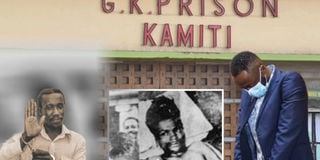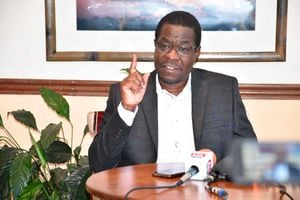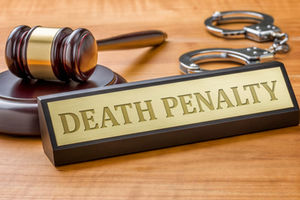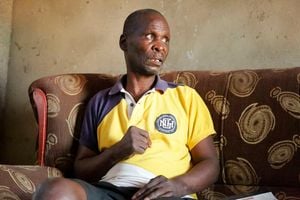
Joseph Irungu, alias Jowie (right) was last week sentenced to death of murder of businesswoman Monica Kimani. The sentence comes 40 years since Senior Private Hezekiah Ochuka (left) was hanged at Kamiti Prison. Freedom fighter Dedan Kimathi (centre) was also executed at the prison.
It will be 40 years on Tuesday, March 19, since the hanging chamber within Kamiti Maximum Prison was used.
That was where Senior Private Hezekiah Ochuka and Sgt Pancreas Oteyo Okumu were hanged for leading the mutiny that almost toppled the dictatorial President Moi on August 1, 1982.
It is also the place that freedom fighter Dedan Kimathi, and many of his Mau Mau comrades breathed last.
It has also been the place where those facing capital punishment ended their earthly sojourn.
Last week’s sentencing to death of Joseph ‘Jowie’ Irungu, who was found guilty of murdering businesswoman Monica Kimani, has triggered debate on the place of death penalty in Kenya.
Human rights campaigners, have over the years challenged the right of State to end life. “Death penalty is vengeful and primitive,” says Prof Makau Mutua, a legal scholar at the State University of New York, on his X account.
Prof Makau argued that the “death penalty has no place in any modern society (since), it’s jurisprudentially inconsistent with the logic, values, and legal philosophy that undergird Kenya’s 2010 Constitution”. His argument is that “no court should ever impose such an irreversible penalty on any offender in Kenya, no matter the heinousness of the crime, or how despicable and depraved the felon”.
It is the irreversibility of the death penalty that has always triggered debate, with human rights activists arguing that it is a primitive “eye-for-an-eye” practice. Amnesty International describes the death penalty as the “ultimate cruel, inhuman and degrading punishment… regardless of who is accused, the nature or circumstances of the crime, guilt or innocence or method of execution”.
The other argument is that the death penalty has never deterred killers – and that in case of miscarriage of justice, it is irreversible. Kenya has been grappling with the death penalty since independence – but with divided opinion. The last efforts were made after former human rights activists joined the Mwai Kibaki government and started championing its scrapping.
By then, then minister for Justice and Constitutional Affairs, Kiraitu Murungi, described it as a “violation of human rights” and called for its abolition. While Kenya has had an unofficial moratorium on enforcing the death sentence, it is still in the statutes, and Parliament has yet to scrap it.
In 2003, then-Vice President Moody Awori released prisoners facing capital offences and expressed his intention to propose a bill to abolish the death penalty. Kenya is not a signatory to the Second Optional Protocol to the International Covenant on Civil and Political Rights, aiming at the abolition of the death penalty.
The Protocol states: “No one within the jurisdiction of a State Party to the present Protocol shall be executed (and that) each State Party shall take all necessary measures to abolish the death penalty within its jurisdiction.” Under Kenyan law, offences of treason, murder, and robbery with violence, including attempted robbery with violence, carry a mandatory death sentence.
During the debate for Kenya’s 2010 Constitution, opinion was divided on the place of the death penalty for capital offences. In the initial Wako draft, human rights activists had pushed through clauses that outlawed capital punishment and recognised the right to life without clawback clauses. It also gave Parliament leeway to legislate the extent to which the State can end life.
However, delegates later voted for its retention as emotions and memories of the post-election violence surged. But the debate has a more extended history. In 1970, for instance, Parliament had an opportunity to discuss Charles Njonjo’s introduction of the death penalty for capital offences, and some MPs felt that this was the wrong move.
Njonjo had shifted from his 1965 position when he had told Parliament that he did not wish to introduce the death penalty for robbery with violence. This position was held after Hamisi MO Carey Godia asked him to consider the same.
In Njonjo’s reasoning, he said: “I consider that the punishment provided by law for robbery is adequate. If the death sentence were introduced for robbery, it would encourage robbers to murder their victims so that there would be no witnesses of their crimes.” But in 1970, Njonjo had a change of heart as violent robberies targeting the elite increased. But not everyone agreed with Njonjo.
“If you go to this court next door,” said Kigumo MP Dr James Munene, “the sentences you hear are for murder cases; murderers are always hanged and yet people are always killed, or they are murdered. This shows that the death sentence is not doing us any good.”
For his part, Tinderet MP Jean-Marie Seroney said: “I do not like the death penalty under any circumstances… I think that we should respect human life, after all one of the Ten Commandments of God says: ‘Thou shall not kill’. I think even human societies should not kill. Instead of increasing the death penalty. We should attempt to reduce it until such a time that we can abolish it altogether.”
Also after Tom Mboya’s assassination in July 1969, Parliament was moved to pass a law on public executions. While moving the Motion, Mbita MP Osingo Migure urged the House to amend the penal code (Cap 63) to read that for “any person sentenced to death, the sentence shall direct that he/she shall be shot in a public place by a firing squad until he/she is dead, the public having been informed in advance of such place of the execution”.
Migure gave the example of Nashon Njenga Njoroge, the man who killed Mboya: “So many people have been asking us: ‘Was this person hanged?’ There have been so many rumours in this country. Some people say this person went to Australia.
Some people say the person who assassinated Tom Mboya went to Ethiopia. People give different stories about this case… if they can shoot Mboya in the middle of the city, in the daytime when people are going for lunch, why can his murderer not be shot at Kamukunji publicly?
Njonjo opposed the shooting and said it was used by “firing squads in communist countries”. He asked those Members “who are interested in seeing executions being done (to) get in touch with the Ministry of Home Affairs and they can be told when an execution is going to take place and they can see it. I want to assure the honorouble members that it is not a pleasant sight”.
Fast forward to the 2010 Constitution and the Supreme Court in the Karioko Muruatetu case reasoned that the mandatory nature of the sentence of death imposed was inconsistent with the Constitution and therefore void. What that meant was that mandatory nature of the death sentence, as provided for under section 204 of the Penal Code, was unconstitutional.
But of importance is that the Supreme Court did not invalidate the death sentence as contemplated under Article 26(3) of the Constitution. Some of the recommendations from the Attorney-General’s office are that the death penalty “should only be reserved for the rarest of rare cases involving intentional and aggravated acts of killing”.
While abolitionists say that the death penalty should be commuted to life, the Court of Appeal in Kenya has further ruled that even the life sentence is unfair.
In July 2023, Justices Pauline Nyamweya, Jessie Lesiit and George Odunga unanimously agreed that it was unfair to outlaw mandatory death sentences only to order a person to remain behind bars until they die.
They said: “Indeterminate life sentence is simply a slow death sentence. It is unfair to outlaw mandatory death sentences only to order a person to remain behind bars until they die. It is unconstitutional to jail a person for life since a life sentence should not mean the natural life of a prisoner.” As Parliament dilly-dallies on the question of the death penalty, and as the public remains divided on the issue, some progressive members of the bar are slowly pushing to new frontiers.
As Jean Marie Seroney once said: “I do not see how you can reform anyone by hanging him. One objection I have about hanging is that it is so final. Evidence can be juggled and no human system is perfect in any criminal case, there is no perfection. Somebody, who is innocent may be found guilty. It may be a case of mistaken identity (but) once you have hanged somebody it is too late (to repair).” On the 40th anniversary of the last hangings in Kenya, Kenyans are still asking whether it is a necessary statute.













